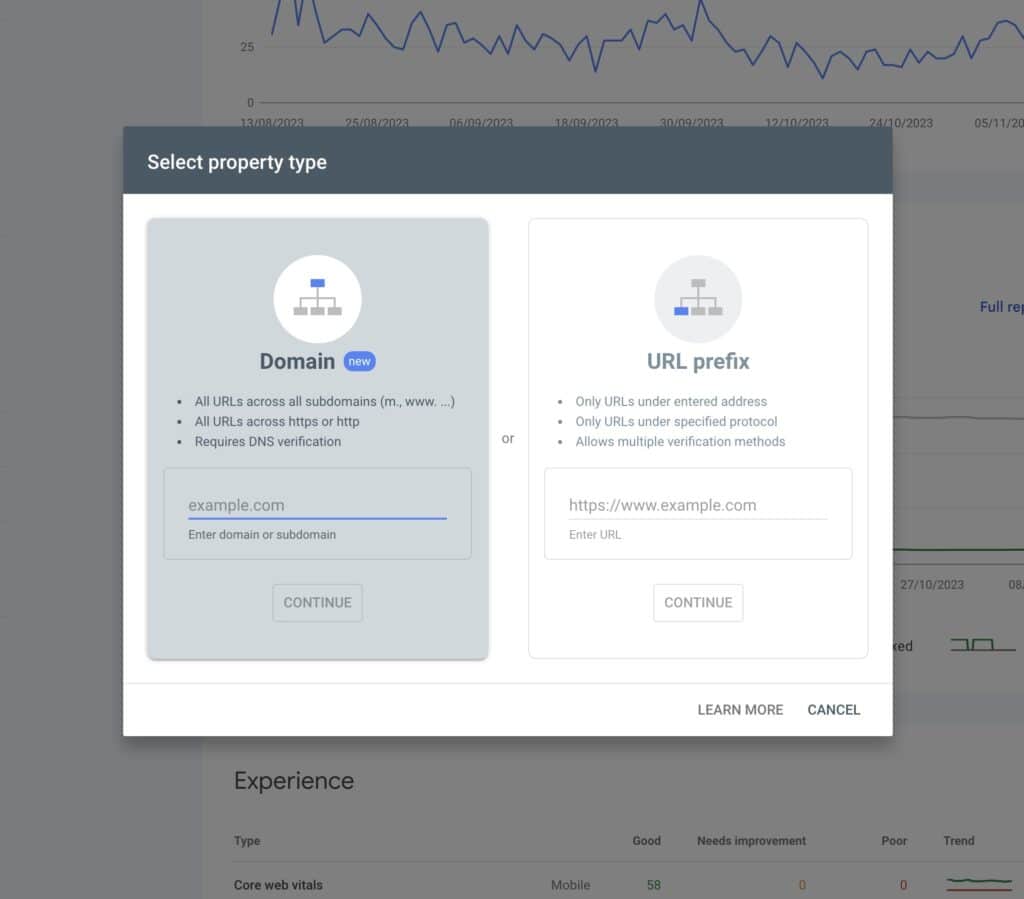When setting up Google Search Console, one of the first questions you’ll encounter is whether to choose the “Domain” or “URL Prefix” property.
This article will explain both options, delve into their differences, and provide guidance to help you make the best choice for your website.

Understanding Domain and URL Prefix Properties
Domain Property
- Definition: Domain properties represent an entire domain, including all subdomains and protocols.
- Scope: Includes http://, https://, http://www., https://www., as well as any subdomains like blog. or shop.
- Verification: Requires DNS verification, which proves control over the entire domain.
- Use Cases: Ideal for those who want a comprehensive view of their domain’s performance across all subdomains and protocols.
URL Prefix Property
- Definition: URL Prefix properties narrow down to specific URLs, including the protocol and optional www prefix.
- Scope: Limited to the specified protocol and subdomain, such as https://www.example.com.
- Verification: Can be verified using multiple methods, such as uploading an HTML file, using an HTML tag, through Google Analytics or Google Tag Manager, among others.
- Use Cases: Best for users interested in tracking a specific part of their site or who cannot verify their site at the domain level.
Comparing Domain and URL Prefix Properties
Domain Property Advantages
- Holistic View: A complete picture of a domain’s search data without setting up multiple properties.
- Consolidated Data: Simplifies the monitoring and analysis performance metrics, which can be especially useful for large websites with many subdomains.
- Aggregated Reporting: Receive combined reports for all subdomains and protocols, saving time and effort in data analysis.
URL Prefix Property Advantages
- Specificity: Allows for focused tracking on a specific protocol or subdomain, making it easier to analyse data relevant to a particular website section.
- Easier Verification: Multiple verification methods provide flexibility and ease for users who may not have access to DNS records.
- Independent Analysis: Enables the separation of data for different subdomains or protocols for a more granular approach to performance monitoring.
Choosing Between Domain and URL Prefix
Your specific needs and capabilities should inform the decision on whether to use a Domain or URL Prefix property. Here are some considerations to help you choose:
Consider Your Website’s Structure
- If you have a simple website without multiple subdomains or protocols, a URL Prefix property may suffice.
- A Domain property would be more appropriate for complex websites with multiple subdomains and protocol variations.
- Think of sites with a shop.domain.com. This would be a prefix property.
Think About Your Management Preferences
- Do you prefer having an aggregated view of your domain’s data, or do you want to manage and analyse each section separately?
- Managing multiple URL Prefix properties can be challenging for large websites.
- You can only upload a disavow file for a URL prefix property.
Assess Your Access to the Domain’s DNS
- DNS verification for Domain properties may not be an option for everyone.
- If you lack access to DNS, a URL Prefix property would be the practical choice.
Anticipate Future Growth and Changes
- Consider the potential evolution of your website. If you plan to expand with more subdomains, starting with a Domain property could save you time and hassle in the long run.
- A URL Prefix property might be more convenient for static websites with no plans for significant structural changes.
Conclusion
Selecting the right property type in Google Search Console is an important decision that affects how you monitor and optimise your site’s search performance.
Domain property is generally better for larger or more complex sites, while a URL Prefix property can work well for smaller, more straightforward areas.
When choosing, consider your website’s structure, management preferences, domain access, and future growth. With the correct property setup, you’ll be well-equipped to improve your site’s search presence and SEO efforts.
If in doubt, create both.






